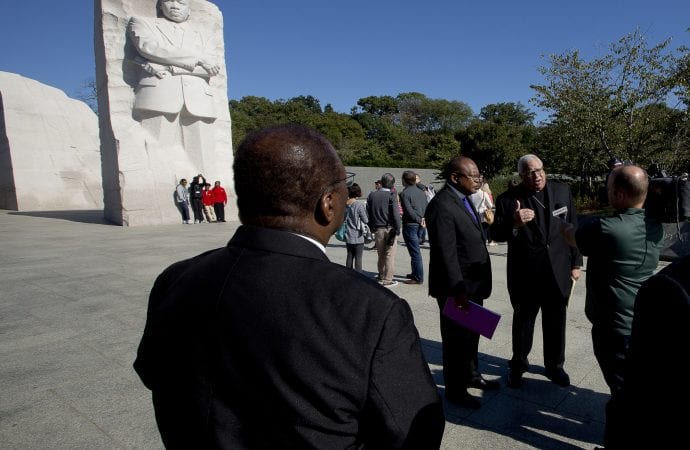On the morning after his installation Mass in Memphis, Bishop David Talley joined a group of friends and family for a tour of the city’s historic National Civil Rights Museum.
“It was an extraordinary two-hour immersion in the evil of slavery, its institutional character, the disastrous effects seen through the generations, and the children and teens and adults that affected great change in our nation in their suffering,” he tweeted after leaving the museum, which is on the site of the Lorraine Hotel where the Reverend Martin Luther King, Jr. was killed 51 years ago.
The following day - on the very anniversary of King’s assassination - Pope Francis appointed Archbishop Wilton Gregory to lead Catholics in the nation’s capital, making him the first African-American prelate to lead an archdiocese seen as a center of African-American culture.
At a press conference that day, Gregory would reflect on King as a “modern day martyr” for justice, peace, and unity.
While black Catholics remain one of the most underserved communities in the U.S. Church, - with fewer than 10 active black bishops and an estimated 250 black priests for a population of 3 million - since the deadly white nationalist riots in Charlottesville, Virginia in August 2017, the fight against racism has increasingly become an institutional focus for the U.S. Catholic Church.
While it was overshadowed by discussions on clergy sex abuse and bishop accountability, at last November’s meeting the United States Conference of Catholics Bishops (USCCB) approved a new pastoral letter on racism - marking the first time in nearly 40 years the bishops spoke collectively on the issue.
The letter, “Open Wide Our Hearts: The Enduring Call to Love,” serves as an update to their 1979 letter, “Brothers and Sisters to Us: A Pastoral Letter on Racism in Our Day.” The letter condemns racism as a sin, stating that it occurs in both “deliberate” acts as well as acts of omission.
It also situates the discussion in the present moment by observing, “Extreme nationalist ideologies are feeding the American public discourse with xenophobic rhetoric that instigates fear against foreigners, immigrants, and refugees.”
At the same meeting, the bishops voted to put forward the cause for canonization of Sister Thea Bowman, a trailblazing African American religious who was the first black woman ever to address the U.S. bishops before her death in 1990, famously leading them in a collective singing of the spiritual “We shall overcome.”
Speaking to a group of more than 500 Catholic social activists last winter, Bishop George Murry of Youngstown, Ohio, said Catholics have “shown a lack of moral consciousness on the issue of race,” but he pointed to the then-newly formed USCCB ad-hoc committee against racism - launched as a direct response to Charlottesville - as proof that the U.S. bishops are seeking to address the issue with real teeth.
Perhaps one example of that was last September when the U.S. Catholic Church put the spotlight on another underserved minority group, Hispanic Catholics, for a four-day long gathering in Fort Worth, Texas known as the “Encuentro,” which brought together over 3,000 Hispanic and Latin American Catholic leaders, along with more than 100 prelates, from throughout the country.
The scene at the Encuentro was both joy-filled and energetic, but also honest as the Church sought to reckon with leadership failings and neglect of a minority population that will soon be a majority in the U.S. Church.
Border Bishop Daniel Flores of Brownsville, Texas said at the time that the aim of the Encuentro was to strengthen the “whole mission of the Church and not one community or another.”
While conferences and committees may only be the start, for many they nonetheless signify a renewed institutional commitment to confronting an ugly aspect of America’s national character, and an area in which many Catholics hope the Church can reclaim a prophetic voice and eventually effect change in the parishes and pews.
Continuing his reflection on the Civil Rights museum, Talley - who left the Southern Baptist Church that he was raised in over the issue of racial segregation - concluded: “The work continues in us.”

